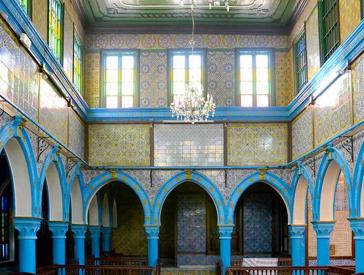New Perspectives on the Supposed Dichotomy of Judaism and Islam
Press Information on the Conference Jews in Muslim Majority Countries: History and Prospects
Press Release, Fri 20 Oct 2017
The international conference Jews in Muslim Majority Countries: History and Prospects takes place from 24 to 27 October 2017 at the Jewish Museum Berlin.
On Tuesday, 24 October at 4 pm, distinguished historian Mark Cohen of Princeton University will inaugurate the conference Jews in Muslim Majority Countries at the Jewish Museum Berlin. Prof. Cohen is an expert on Jewish history and culture in the medieval Islamic world, and investigates the then largely peaceful coexistence of Jews and Muslims in the areas of Muslim rule. The public lecture opens the first international conference on this scale in Germany to discuss Jewish history in the Muslim world.
- Kontakt
-
Press office
T +49 (0)30 259 93 419
presse@jmberlin.de - Address
Jewish Museum Berlin Foundation
Lindenstraße 9–14
10969 Berlin
The conference runs from 24–27 October 2017, focusing on political and historical research into Jewish minorities in the Middle East and in North Africa, as well as present-day memory cultures. It concludes the program Between Marrakesh and Mashhad: Jews in Islamic Countries, a one-year series of films and readings in the Academy programs of the Jewish Museum Berlin. The conference closes the series by returning once more to Jewish life outside of Europe and the Ashkenazi tradition.
The conference is convened jointly by the Academy and the Research Network Reconfigurations: History, Remembrance and Political Transformations in the Middle East and North Africa, based at the University of Marburg. “The conference builds on an existing tradition of Jewish studies within German Oriental studies,” says Achim Rohde, research coordinator of the Reconfigurations network.
New perspectives on Mizrahi (Oriental) Jews
By looking afresh at the history of Jewish–Muslim relations in the countries of the Middle East and North Africa – relations that were relatively amicable for many centuries – the conference turns the spotlight onto the Jewish presence as an integral part of the region’s history. “We want to disrupt familiar perspectives and break away from the idea of Judaism and Islam as a dichotomy,” says Yasemin Shooman, head of the Jewish Museum Berlin’s Academy programs. “The topic takes us into a polarized field where some polemicize, others romanticize. We want to counter that with a more nuanced approach based on sound scholarship, in the hope of bringing more objectivity to the debate.”
Present-day Jewish communities in the Middle East and North Africa
The majority of the Jewish populations in Middle Eastern countries emigrated during the 1950s and 1960s. Today, the only Jewish communities of any substantial size are to be found in Iran, Turkey, Morocco, and Tunisia. Due not least to the Israeli-Palestinian conflict, it is difficult nowadays to avoid perceiving Jews and Muslims as rigorously separated groups. Yet in very recent times, members of the scholarly and creative community in these countries have been showing an increasing interest in their Jewish history.
Iraq as a place of origin for Jewish culture
A scholarly tradition of Jewish studies exists at many universities in the Middle East and North Africa (MENA), but so far its discourse has seldom spread beyond the MENA world. For the first time on such a large scale, the conference at the Jewish Museum Berlin brings together scholars who otherwise rarely have a chance to meet. The call for papers itself attracted an enormous response: 120 submissions were received, many from the United States and Israel, but also several from Muslim countries such as Iran, Iraq, Lebanon, Morocco, and Egypt. Among the presenters are Aomar Boum of UCLA, speaking about Morocco’s Jewish life in memory; Najat Abdulhaq, who comes from Palestine and is carrying out research in Berlin, on Arab Jews in contemporary literature; and Mazin Ali, from Baghdad, on Jewish culture in Iraq. Ella Shohat of New York University chairs the roundtable discussion “Jewish Studies in MENA Countries,” before a closing forum in which early-career researchers discuss their work with established scholars.
The Selma Stern Center for Jewish Studies Berlin-Brandenburg and the research program Europe in the Middle East – the Middle East in Europe, based at Berlin’s Forum Transregionale Studien, are involved in the conference as cooperation partners.
The conference language is English; simultaneous interpretation will be provided at the opening event.
The event takes place at the W. Michael Blumenthal Academy of the Jewish Museum Berlin.
For accreditation and to arrange interviews, please email the Press Office at presse@jmberlin.de or call +49 (0)30 259 93 419.
The full program can be accessed at here.




